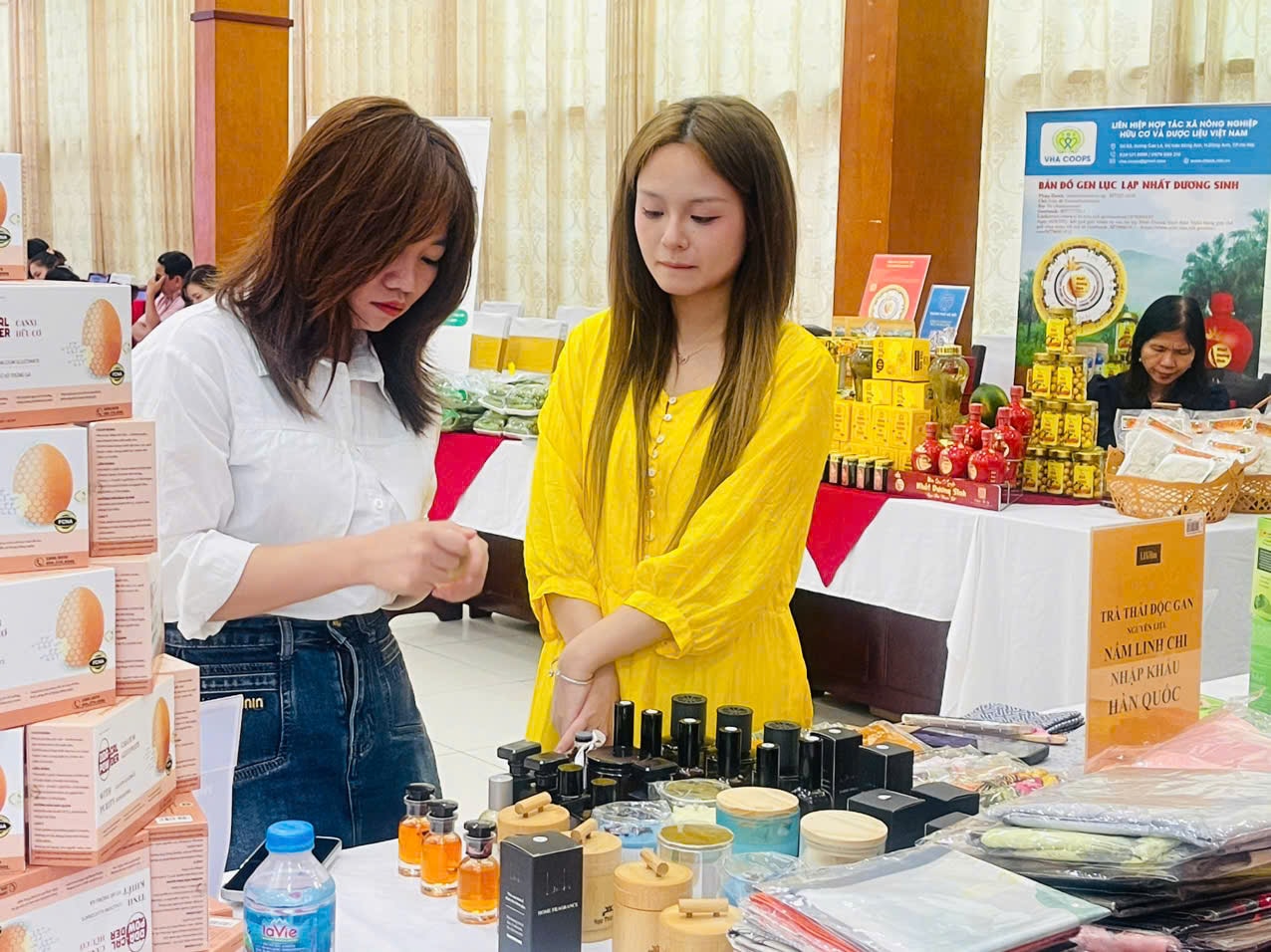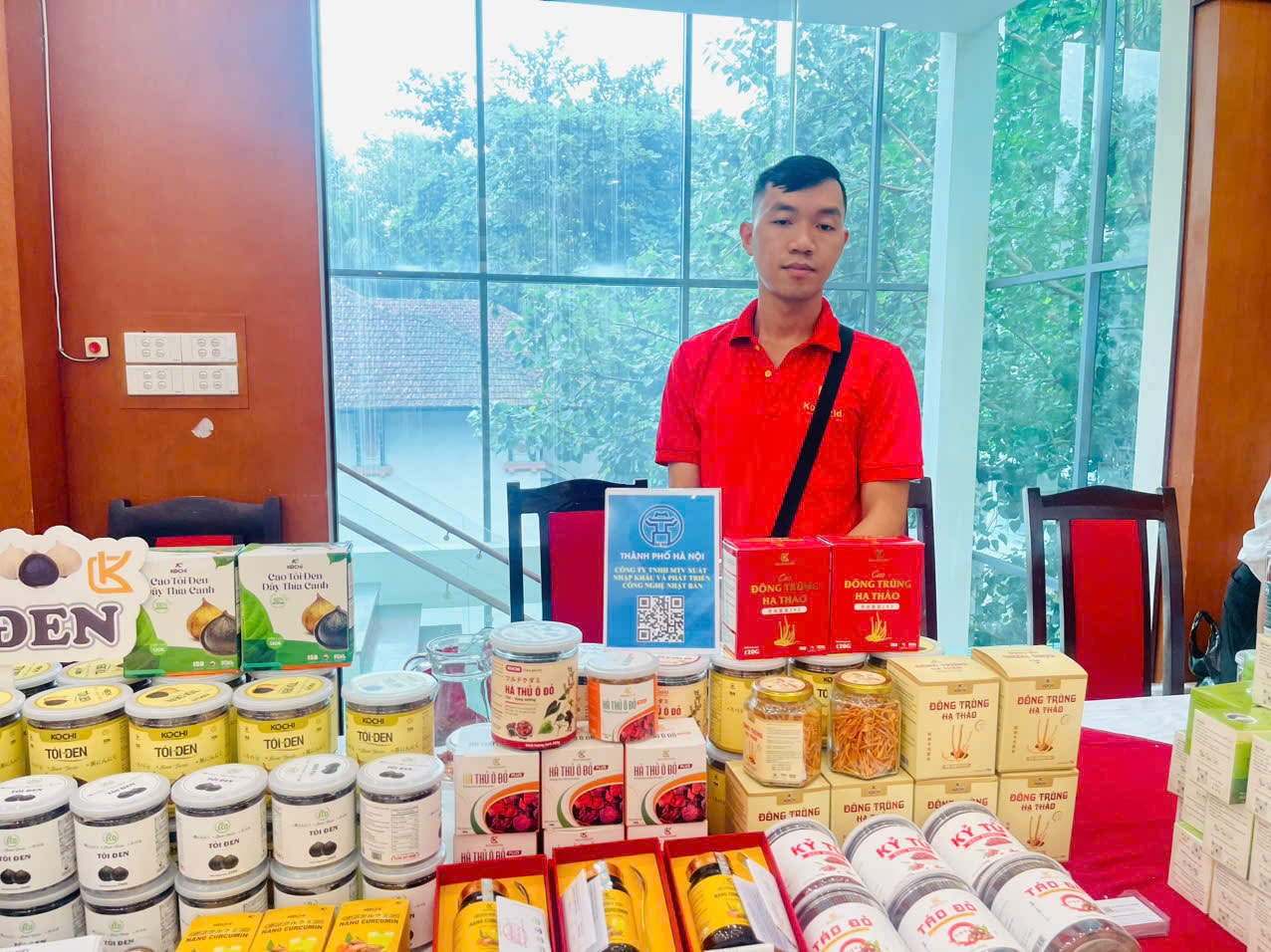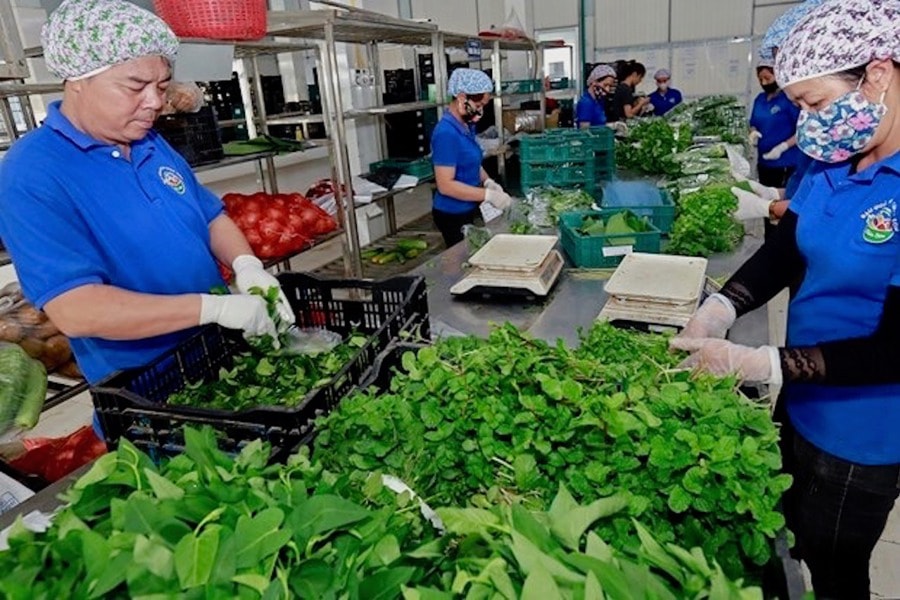Hanoi embraces digital transformation in agriculture
The application of information technology to the management of farmland, aquaculture, and food traceability aims to ensure food safety while improving business production.
Digital technology has helped local businesses to increase productivity, reduce labor costs, and ensure food safety, enhancing market competitiveness.
Digital transformation tools have been used in data digitization, land standardization, and agricultural databases for crops, livestock, and aquaculture to interconnect national and sector-specific databases.
To step up trade promotion, Nguyen Dinh Hoa, Deputy Director of the Hanoi Department of Agriculture and Rural Development, said that the department will help agricultural producers showcase key products and OCOP (One Commune One Product) offerings on e-commerce platforms when he presented the department's digital transformation plans on October 17.
| Many products are displayed at a trade promotion event in Hanoi. Photos: Hanoimoi Newspaper |
Meanwhile, Nguyen Quoc Toan, Director of the Center for Agricultural Digital Transformation and Statistics under the Ministry of Agriculture and Rural Development, said that the ministry will work with localities to expedite the completion of the agricultural data system.
"We aim to make timely and appropriate policies to facilitate digital transformation in agriculture to ensure a focused and effective approach," he emphasized.
He added that there will be a strong focus on linking agricultural production with consumption, promoting rural tourism services, and tapping into e-commerce platforms and online payment systems to boost agricultural product sales.
E-commerce platforms expand market access for farmers
| Safe agricultural products are QR-coded to track and trace. |
Nguyen Thi Thu Hang, Director of Hanoi's Sub-Department of Agro-Forestry and Fisheries Quality Management, said Hanoi's "Food Origin Tracking System" for agricultural, forestry, and fishery products on the website check.hanoi.gov.vn has been working to provide guidance and created accounts for 3,533 entities, including agricultural and aquatic cooperatives and production facilities.
It has also provided 14,050 QR codes for food products that meet safety criteria. In addition, the self-declaration software for agricultural, forestry, and fishery products has published 3,446 dossiers for processed items in 2024.
"Hanoi has helped farmers and businesses promote their agricultural products on e-commerce platforms, expand market access, and connect directly with consumers," she said.
She reported that agribusinesses are increasingly using digital marketing strategies to promote their products and build brands through social media platforms such as Facebook, TikTok, and Zalo, as well as websites and mobile apps.
"This approach increases product visibility and attracts customers from both domestic and international markets," added Hang.
Sharing the same idea, Nghiem Tuan Anh, Deputy Director of the Office of the Vietnam Post Corporation, emphasized that putting agricultural products on e-commerce platforms not only improves market access but also increases economic efficiency for agricultural producers. In response, the company has developed a specialized e-commerce platform for Vietnamese agricultural products at Buudien.vn.
Since the beginning of the year, Buudien.vn has listed nearly 3,600 products under the OCOP program, totaling 8,240 on the platforms, accounting for 79% of the national OCOP output.
In September alone, the platform recorded 14,250 transactions with a total value of over VND4.2 billion (US$166,624). Buudien.vn aims to sell 400 tons of agricultural products in the fourth quarter, Tuan Anh said.
| Local workers are at work at the Chuc Son Clean Vegetable Cooperative facility. |
Chuc Son Clean Vegetable Cooperative in Chuong My District is a pioneer in digital transformation in the agricultural sector. General Director Hoang Van Tham said 100% of the cooperative's processed and packaged vegetable products have QR codes for traceability.
Currently, the cooperative's vegetables are sold in major supermarkets, including Lotte, Big C, Go, and Tops, as well as 21 schools, three hospitals, and four food processing enterprises in Hanoi. In the first nine months of 2024, the cooperative achieved a total consumption of 640 tons and grossed VND18 billion ($714,102).
Placing agricultural products on e-commerce platforms allows farmers and businesses to reach consumers in different regions, reducing dependence on traditional markets, according to the director of the Hanoi Sub-Department of Agro-Forestry and Fisheries Quality Management.
Looking ahead, Hanoi's agriculture sector plans to continue developing smart farming models and integrating digital technology into agriculture and rural development. This includes strengthening trade promotion to help OCOP products gain visibility on e-commerce platforms.
In addition, the department will expand online interaction channels with residents regarding administrative procedures, providing information on regulations, policies, and stable consumption of safe agricultural products.
Hanoi aims to develop modern, circular agriculture Hanoi aims to develop a modern, circular agriculture sector that adapts to the growth of agro-processing industries and climate change while stimulating consumption by boosting the application of information technology, according to the city's Department of Agriculture and Rural Development. Digital transformation, mechanization, and automation used in farmland management, aquaculture, and food traceability demonstrate the department's support to consumers and enterprises while improving corporate governance and production management. There are currently 285 high-tech agricultural production models in Hanoi, including 185 in crop production, 45 in animal husbandry, 54 in aquaculture, and one that combines crop and animal husbandry. High-tech agricultural products account for about 40% of the total agricultural production value in the city. The existing high-tech agricultural models in the city, while not yet large scale, have proven to be economically effective and appropriate to local conditions. These models play a crucial role in promoting agricultural development in the city, benefiting both local communities and the local economy. Looking ahead to 2030, the city aims to excel in key hi-tech innovations, manage production through integrated value chains, and enhance high-tech agricultural models. The city plans to establish around 30 hi-tech agricultural cooperatives and support at least 40 enterprises in this thriving sector. Additionally, it intends to develop 250 high-tech cooperative models, all focused on sustainable development and value enhancement. Products from these hi-tech agricultural enterprises will need to meet stringent safety and environmental standards and obtain international certification. This commitment will boost product value and strengthen the competitive advantage of Hanoi's agricultural products both locally and globally.
|














